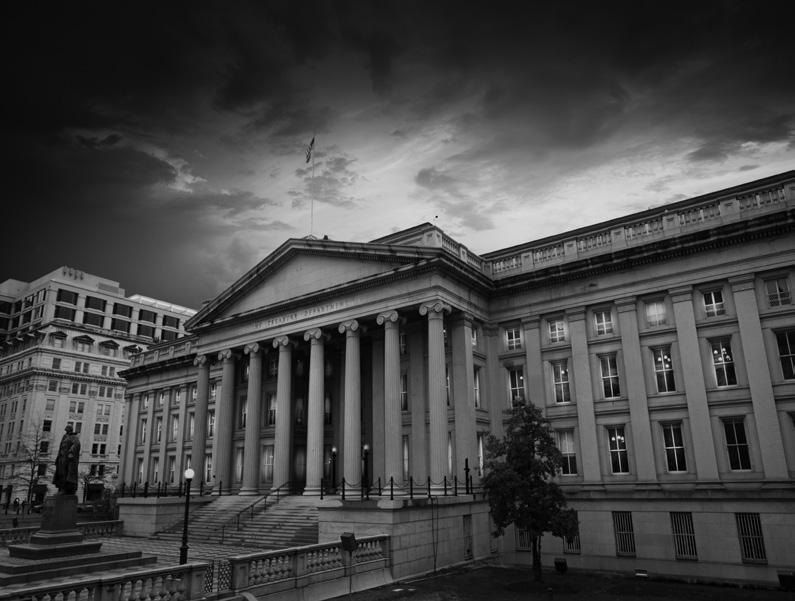a biblical view on The Deep State

kerby anderson



kerby anderson


Wikipedia refers to the deep state as a conspiracy theory. Whether that designation is accurate depends on your definition of “deep state.” If you mean that there is a dangerous group within the federal bureaucracy working to fulfill some of the fears spread by QAnon conspiracists, then the conspiracy label is accurate. But if you are talking about life-long bureaucrats buried deep within the federal bureaucracy who are unaccountable to the American people and often more interested in
their survival and their department of the bureaucracy’s survival, then the conspiracy label is incorrect.
Forty years ago, when I was studying government in graduate school, political scientists were talking about how the bureaucracy had become the fourth branch of government. They were talking about how the iron triangle between congressional committees, the bureaucracy, and interest groups worked together. At the time, it was seen as a major challenge facing President Reagan. Decades later, the bureaucracy is bigger, and many bureaucrats have become even less interested in working with an incoming president. After all, the president will be gone in four years or eight years (at most), and they will continue working long after that administration is but a mention in the history books.
The phrase “deep state” actually comes from a translation of a Turkish phrase. It was an attempt to describe what
one author called “a kind of shadow or parallel system of government in which officials or publicly unacknowledged individuals play important roles in defining and implementing state policy.” In Turkey, those “unacknowledged persons” were, in fact, agents of various criminal organizations.
You see a similar situation south of the border. The drug cartels in Mexico have made significant inroads into the government. They have such control of various levels of government that it is difficult for the president and other elected officials to defeat them.
Politicians and pundits who use the term “deep state” to describe the government bureaucracies in this country don’t mean it in that way. They merely mean that there seems to be a parallel system of government that appears to sometimes operate outside of official channels. These bureaucrats have done quite a bit to frustrate incoming presidents.
Former president Donald Trump used the term “deep state” more than previous presidents. That led to a question from the White House press corps for White House Press Secretary Sean Spicer. He observed that after eight years of one party in office, “there are people who stay in government” who actually “continue to espouse the agenda of the previous administration” and have actually “burrowed into government.”
In researching this, I found it interesting that articles written a few years ago usually dismissed President Trump’s tweets about a “deep state.” But an article in Politico written the day before the inauguration of Joe Biden warned that a “deep state” of Trump loyalists might be undermining the Biden administration. The article pointed to a number of Trump administration political appointees that were “burrowing” into career positions throughout the federal government. Apparently, the idea of a “deep state” was more of a conspiracy theory when Trump
was in office, but suddenly the idea of a “deep state” was a real threat to a Biden administration.
It appears that the American idea of a “deep state” bureaucracy actually goes all the way back to the 1950s. President Dwight Eisenhower warned about what he called the “military-industrial complex” in a televised farewell address. His speech was especially significant since he had previously served the nation as the military commander of the Allied forces during WWII. He was concerned that there was still in place a permanent armaments industry. He was concerned about this alliance between the arms industry and the military establishment. That’s why he called on Americans to monitor this military-industrial complex.
Long before Donald Trump took office, some commentators were talking about a deep state. Liberals were concerned that after the 9/11 attacks, a sort
of shadow government was developing in the intelligence community and defense department. These opaque sections of the federal government were often unaccountable to our legal system.
Edward Snowden, a National Security Agency contractor, began to leak information about the dangerous reach of the government’s surveillance programs. In one interview, he proclaimed, “There is definitely a deep state.” And then he added, “Trust me, I’ve been there.”
Two books were published during that period describing the idea of a deep state. Michael Glennon (Tufts University law professor) wrote about National Security and Double Government. This dualstate system, he explained, began under President Bush but was continued under President Obama.
Mike Lofgren (former congressional aide) wrote about The Deep State: The Fall of the Constitution and the Rise of a Shadow Government. He argued that there is “the
visible government situated around the Mall in Washington, and then there is another, more shadowy, more indefinable government that is not explained in Civics 101 or observable to tourists at the White House or the Capitol.” He explained that it wasn’t a “secret, conspiratorial cabal” but rather “the state within a state is hiding mostly in plain sight.”
Then came the election of Donald Trump. All of a sudden the sides reversed. Conservatives who were dismissive of NSA surveillance were complaining about intelligence leaks. Liberals, who used to be so concerned about the surveillance state, were now supportive of spying on the president. This was best illustrated when a former deputy director of the CIA bragged at a university speech, “Thank God for the deep state.” A former CIA director even argued that the executive branch had an “obligation” to not carry out what he felt were flawed orders from President Trump.
The reason we have an executive bureaucracy is to benefit from the research and experience of public servants who have devoted their lives to understanding the social and political implications of federal policies. This has always been a necessary function, but especially with the last few presidents. Barack Obama became president after serving half a term in the US Senate. Donald Trump never served in government. They brought less experience than, for example, George H.W. Bush, who served eight years as Vice President along with serving as UN Ambassador, Liaison to China, and CIA Director. The experts in the bureaucracy can provide context and prevent presidents and their cabinets from making huge mistakes.
But there is another side to the federal bureaucracy. We may suppose that bureaucrats are there to implement the policies of the President and administration. Political appointees to the cabinet always say that they “serve at the plea-
sure of the president.” That may be true for them. But a career civil servant has a different perspective and expects to be in government much longer than the four or eight years a president holds office. We may think of the bureaucracy as similar to a military unit (where every order is routinely obeyed). But the bureaucracy is often more like a university faculty (where you are part of a team but also have many of your own ideas about what should be done). Often the federal bureaucracy slows down the implementation of the president’s policies or even chooses to ignore them.
As I discussed in a previous booklet on The Liberal Mind, even with the best of bureaucrats, the “road to serfdom” can be paved with good intentions. Fredrick Hayek wrote his book with that title because he was concerned that most government officials and bureaucrats write laws, rules, and regulations with good intention. They desire to make the world a
better place. But they also seek to control more and more aspects of our lives. This can especially be a concern when the entrenched bureaucrat believes he or she knows best and chooses to ignore directives from the White House and even undermine the actions of the president.
As Christians, we would assume that someone in the bureaucracy would be a servant leader. We would assume bureaucrats would want to serve the public and provide services through the government. While there are millions of dedicated civil service workers, there are also people who are selfish and merely looking out for themselves.
It is also true that one of the most important functions for someone working in a government bureaucracy is to make sure that the bureaucracy will continue. Survival of their political world becomes more important than meeting the needs of the American people.
That is one reason why those in the bureaucracy might turn against a president (or member of Congress) trying to reform the system. This is also true if they have a different political agenda and are working to undermine a president’s agenda. As Christians, we should not be surprised by this. We begin with the assumption that all have sinned and fall short of the glory of God (Romans 3:23). As people created in God’s image (Genesis 1:27), we manifest noble traits (honesty, altruism). But as sinful individuals, we also display a wide range of sinful traits (dishonesty, corruption, selfishness).
Even the best of government servants may not always be wise, compassionate, and altruistic. That is why the founders of this country established checks and balances in government to limit the impact of sinful behavior. The difficulty is that the federal bureaucracy has become more important and influential than the other
branches of government. And Congress has been willing to let unelected bureaucrats make more and more decisions that affect our lives.
As Christians, we should support our government because it is one of the institutions ordained by God (Romans 13:1-7). But we should also call for transparency and accountability from a bureaucracy that is often unaccountable to the citizens of this country.
Kerby Anderson, A Biblical View on The Liberal Mind, POV booklet, 2020.
Michael Crowley, “The Deep State is Real,” Politico, September/October 2017.
Rebecca Gordon, “What the American ‘deep state’ actually is, and why Trump gets it wrong”.
Business Insider, January 27, 2020.
Mike Lofgren, The Deep State: The Fall of the Constitution and the Rise of a Shadow Government, New York: Penguin, 2016.
